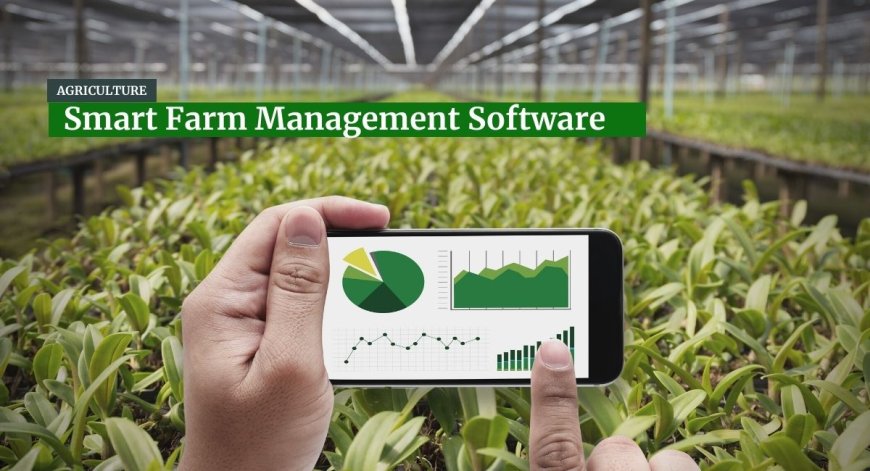How Cloud-Based Farm Management Software Can Improve Your Agricultural Business

Are you ready to take your agricultural business to the next level? Harnessing the power of data is key in today's competitive market, and cloud-based farm management software is here to revolutionize the way you run your operation. From tracking crop yields to monitoring equipment maintenance, this technology has the potential to streamline your processes and maximize efficiency. Join us as we explore how adopting this innovative tool can help transform your agricultural business for the better.
Introduction to Cloud-Based Farm Management Software
Are you ready to revolutionize your agricultural business and take it to new heights? Imagine harnessing the power of data like never before, all through the innovative technology of cloud based farm management software. In this digital era, where efficiency and precision are paramount, embracing cutting-edge solutions can be the key to unlocking your farm's full potential. Let's dive into how cloud-based software is transforming the agriculture industry and how it can propel your business forward.
Benefits of Implementing Cloud-Based Software in Agricultural Business
Imagine the vast potential of your agricultural business unlocked through the power of cloud-based software. By implementing this innovative technology, you can experience a plethora of benefits that will revolutionize the way you manage your farm operations.
Firstly, cloud-based software provides real-time access to essential data and analytics from anywhere with an internet connection. This accessibility allows you to make informed decisions promptly, leading to improved productivity and efficiency on your farm.
Moreover, by centralizing all your farm data in one secure platform, you can streamline processes such as inventory management, crop planning, and equipment maintenance. Say goodbye to manual record-keeping and welcome automated systems that simplify tasks and reduce human errors.
Additionally, with cloud-based software facilitating seamless communication between different departments within your agricultural business, collaboration becomes more efficient than ever before. Embrace this digital transformation to stay ahead in today's competitive market landscape.
How Cloud-Based Software Improves Data Collection and Analysis
With the ever-evolving landscape of agriculture, data collection and analysis have become paramount for informed decision-making. Cloud-based farm management software offers a streamlined approach to gathering and processing data, providing farmers with real-time insights into their operations.
By centralizing all relevant information in one digital platform, farmers can easily track key metrics such as crop performance, weather patterns, soil quality, and equipment usage. This consolidated data allows for more accurate forecasting, leading to improved crop yields and resource allocation.
Moreover, cloud-based software enables comprehensive analysis through advanced algorithms and predictive modeling. Farmers can identify trends, patterns, and potential risks faster than traditional methods. This proactive approach empowers them to make timely adjustments that optimize efficiency and profitability.
In essence, by harnessing the power of cloud-based technology for data collection and analysis purposes, agricultural businesses can stay ahead in a competitive market while driving sustainable growth.
Streamlining Operations and Increasing Efficiency with Cloud-Based Software
In the fast-paced world of agriculture, efficiency is key to success. Cloud-based farm management software offers a powerful solution for streamlining operations and boosting productivity on the farm.
By centralizing data storage and access in the cloud, farmers can easily track inventory levels, monitor equipment usage, and manage crop cycles all in one place. This eliminates the need for manual record-keeping and reduces the risk of errors or delays in decision-making processes.
With real-time updates and notifications, farmers can make quick adjustments to their operations based on accurate data insights. Whether it's adjusting irrigation schedules or optimizing planting strategies, cloud-based software empowers farmers to act swiftly and decisively.
Furthermore, by automating routine tasks such as inventory tracking or supply chain management, farmers can free up valuable time to focus on strategic planning and innovation. This shift towards more efficient workflows not only saves time but also improves overall profitability in the long run.
Real-Life Examples of Successful Implementation of Cloud-Based Farm Management Software
In today's digital age, the successful implementation of cloud-based farm management software has revolutionized agricultural practices for many farmers. One real-life example is a large-scale dairy farm that integrated cloud-based software to monitor milk production, track animal health records, and manage inventory seamlessly. By accessing real-time data remotely, the farm was able to make informed decisions promptly.
Another example is a family-owned vineyard that utilized cloud-based software to optimize irrigation schedules based on weather forecasts and soil moisture levels. This resulted in significant water savings and improved crop yields. Additionally, the ability to analyze historical data helped them forecast demand accurately and streamline their distribution process efficiently.
Furthermore, a cooperative of smallholder farmers embraced cloud-based software to collaborate on crop planning, share best practices, and access market prices in real-time. This led to increased productivity and profitability for all members involved. These success stories demonstrate how cloud-based farm management software can empower agricultural businesses of all sizes to thrive in today's competitive landscape.
Potential Challenges and Solutions for Adopting Cloud-Based Software in Agriculture
When it comes to adopting cloud-based software in agriculture, there are some potential challenges that farmers may face. One common concern is the initial investment required to implement the technology on the farm. Farmers might also worry about connectivity issues in rural areas that could affect their ability to access and update data in real-time.
Another challenge is ensuring data security and privacy, as sensitive information about crops, yields, and operations is stored on the cloud. Training staff members to use the new software effectively can also be a hurdle for some agricultural businesses.
However, these challenges can be overcome with proper planning and solutions. Providing training sessions for employees will help them feel more comfortable using the software. Implementing robust cybersecurity measures can safeguard sensitive farm data from unauthorized access or breaches.
By partnering with reliable service providers who offer ongoing support and maintenance, farmers can ensure smooth integration of cloud-based software into their operations without disruptions.
Conclusion: The Future of Agriculture and the Role of Technology
The future of agriculture is undoubtedly intertwined with technology. As the industry continues to evolve, embracing cloud-based farm management software will be crucial for staying competitive and maximizing efficiency. By harnessing the power of data through innovative software solutions, agricultural businesses can revolutionize their operations, increase productivity, and make more informed decisions.
As we look ahead, it is clear that those who adapt and embrace technology will thrive in the ever-changing landscape of agriculture. Cloud-based farm management software is not just a trend but a fundamental tool that has the potential to transform the way farms operate and contribute to sustainable practices in farming. So, equip your agricultural business with cutting-edge technology and pave the way for a successful future in agriculture!
What's Your Reaction?
 Like
0
Like
0
 Dislike
0
Dislike
0
 Love
0
Love
0
 Funny
0
Funny
0
 Angry
0
Angry
0
 Sad
0
Sad
0
 Wow
0
Wow
0















































